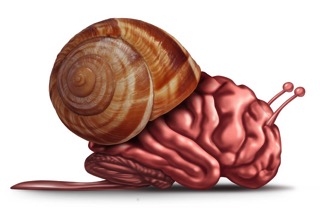
Do you suffer from brain fog? That muggy feeling your brain is operating in a puddle of mud and life is moving in slow motion. People think brain fog is funny or normal, but it's not. It's a red flag your brain is inflamed, functioning poorly, and likely degenerating too quickly.
What causes brain fog and why should you care? Consider these reasons:
1. Brain cells not communicating well with each other
Brain fog happens when brain cells, or neurons, don't communicate well with each other. This causes brain function to slow down and diminish, giving you symptoms of brain fog.
Many factors cause neurons to fire sluggishly or not all with each other, which I'll talk about more in this article.
When you have brain fog, you have to ask yourself, "Why are my neurons not able to fire effectively?"
2. Unstable blood sugar and brain fog
Blood sugar that swings too low or too high can cause brain fog. Symptoms of low blood sugar include irritability or lightheadedness between meals, cravings for sweets, waking up at 3 or 4 a.m., dependence on coffee or sugar for energy, becoming upset easily, and forgetfulness.
Symptoms of high blood sugar (insulin resistance) include fatigue after meals, constant hunger, cravings for sweets not relieved by eating them, constant thirst, frequent urination, difficulty falling asleep, and a big belly.
Blood sugar that is too low or too high means neurons are not receiving the energy they need to function, which often causes brain fog.
Unstable blood sugar is commonly caused by eating too many processed carbohydrates and sugary items, skipping meals, or chronic overeating.
Quite often relieving symptoms of brain fog can be as easy as stabilizing your blood sugar. Eat a whole foods diet based around vegetables, proteins, and healthy fats. Avoid sweets and processed foods, and keep carbohydrate consumption to a level that prevents symptoms of low or high blood sugar.
3. An unhealthy gut environment
Communication between the gut and the brain is ongoing and intimate. Bad gut health affects the brain and can cause symptoms of brain fog.
For instance, some people develop brain fog after eating certain foods, such as gluten, that trigger inflammation in the gut. If you have digestive problems, your gut may be playing a role in your brain fog.
Leaky gut is a condition in which the lining of the intestine becomes overly porous, allows undigested food particles, yeast, bacteria, and other harmful compounds to enter the bloodstream.
This triggers chronic inflammation in the gut, body, and brain, along with other health problems, such as food intolerances, pain, autoimmune disorders, skin issues, joint problems, depression, and, of course, brain fog.
4. Poor circulation and brain fog
Are your fingers, toes, and nose are cold to the touch? This may mean your brain is not receiving enough oxygen due to poor circulation. Other symptoms of poor circulation include weak nails, fungal nail infections, low brain endurance, and cramping in the hands and feet.
Low circulation deprives the brain of oxygen and nutrients, thus causing brain fog. Factors that cause low circulation include anemia, chronic stress, hypothyroidism, low blood pressure, smoking, and blood sugar imbalances.
5. Autoimmune disease and brain fog
Autoimmunity is a disorder in which the immune system attacks and destroys body tissue. Examples include Hashimoto's hypothyroidism, Type 1 diabetes, and rheumatoid arthritis.
This chronic inflammation goes on to inflame the brain, which hampers function and can cause brain fog. Brain fog is a common complaint among autoimmune sufferers.
Also, autoimmune attacks in the brain are more common than people realize. This, too, is linked with brain fog.
Don't assume your brain fog is something to shrug off. It's best to discover the underlying causes of brain fog and address them. This will not only give you better brain function but also help prevent dementia later in life. Ask my office for more information.



Latest from the Blog
The Death of Red Dye #3
January 15, 2025What Is Red Dye No. 3? Red Dye No. 3, or Erythrosine, is a synthetic food color derived from coal tar. It was first approved by the FDA in the 1950s and quickly became one of the most popular artificial colors in food and cosmetics. Red Dye No. 3 was used in everything from candies, […] Read more
Latest from the Blog
Do You Know What Is In Your Protein Powder?
What’s Really in Your Protein Powder? Understanding the Risks Protein powders are a staple in many health-conscious diets, from athletes seeking muscle recovery to those simply aiming to boost their daily protein intake. With a wide variety of options available, choosing the right one can feel overwhelming. However, recent findings have raised concerns about what’s […] Read more